A major indicator that authoritative narratives are in need of tough, objective scrutiny is when important details within the narratives start disappearing. Evert Wesker – to borrow a line made famous by U.S. Senator John Kerry – was ‘for Shell before he was against Shell,’ similar to the way Greenpeace people favored their links to their own scan copies of the notorious American Petroleum Institute’s (API’s) “Victory Will Be Achieved …” memos before they seemingly turned against them. Since my Part 3 in this series concerned Wesker’s role in linking to the API memos, let’s start with another problem I spotted with his specific narrative.
First, recall from my Part 3 that I showed how Wesker’s online transcript for the leaked memos text had two non-memo declarative sentences he wrote at the top of his webpage.
The problem I saw after I posted Part 3 was when I revisited the oldest February 2007 Internet Archive system’s capture of Wesker’s page, and then arbitrarily chose to look at a newer capture from April 2011. There’s only one declarative sentence in his 2011 version:
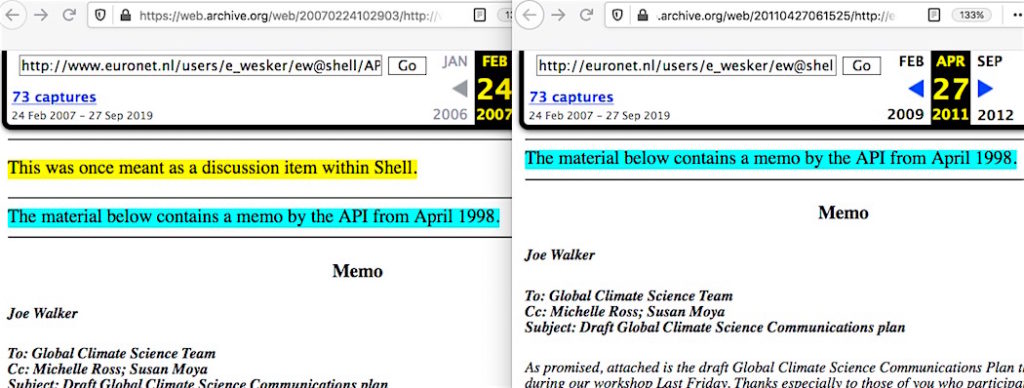
“This was once meant as a discussion item within Shell” vanished, never to reappear in any subsequent Internet Archive capture of the page.
If only Wesker was still alive, reporters could ask him why his statement about Shell disappeared, and what exactly he was implying when he stated the memos were “meant as a discussion.” Meant to be discussed and potentially used is substantially different from actually used. If the memos weren’t used, that would fatally undermine accusations which rely on them as evidence to prove fossil fuel industry disinformation campaigns exist, wouldn’t it?
But Evert Wesker is dead and his API memos text page is long gone, so now this becomes a far larger Greenpeace ‘go-to’ problem.
The place where Evert Wesker got his fame for having his online text as the main go-to source for the API memos was the Union of Concerned Scientists’ 2007 “Smoke, Mirrors & Hot Air” report — in which they thanked Greenpeace’s Kert Davies for pointing UCS toward source material. However, Greenpeace had their own 2002 “Denial & Deception” report that was written by Kert Davies. Whether a person looks at Greenpeace’s 2002 or 1998 source references, they clearly had their own copies of the API memos which would’ve been ideally suited for the UCS to show / link to in their 2007 report. Hold that thought about Kert Davies knowing about those copies, I’ll return to it in a moment.
In 2008, Greenpeace’s website mentioned the API memos and provided a link, (“http://research.greenpeaceusa.org/?a=view&d=4383”) embedded in the “communications strategy” words within their “Exxon finally admits denialists cause problems” article. The link clearly goes straight to another of Greenpeace’s pages, and the scans there are undoubtedly the same API memos scans they showed in their 2002 Denial & Deception report’s appendix – compare them both side-by-side, notice the identical scratches and dots in the lower and left margins.
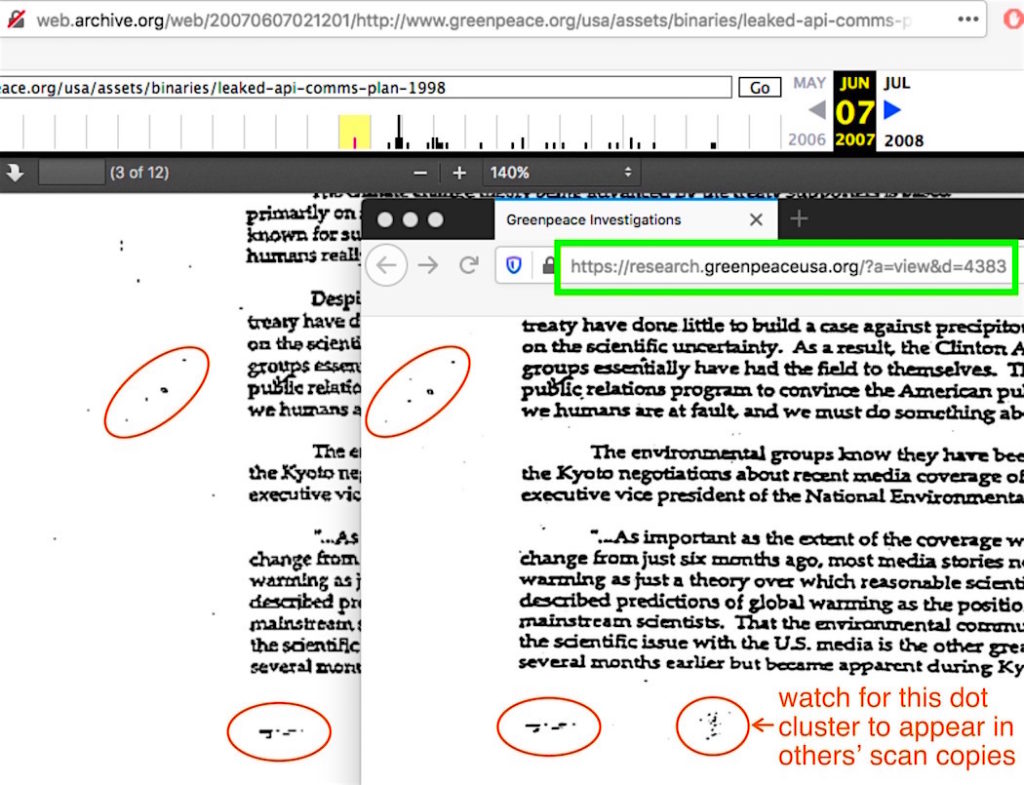
Yet in this February 9, 2017 PDF file* [* 4/8/21 author’s note: that link no longer works; here’s my downloaded file version instead] in Greenpeace’s system for a Philippines filing of material from the Center for International Environmental Law, the source for the API memos is Inside Climate News’ scan copies of the API memos ….. which are identical to Greenpeace’s scans – same scratches and dots in the margins.
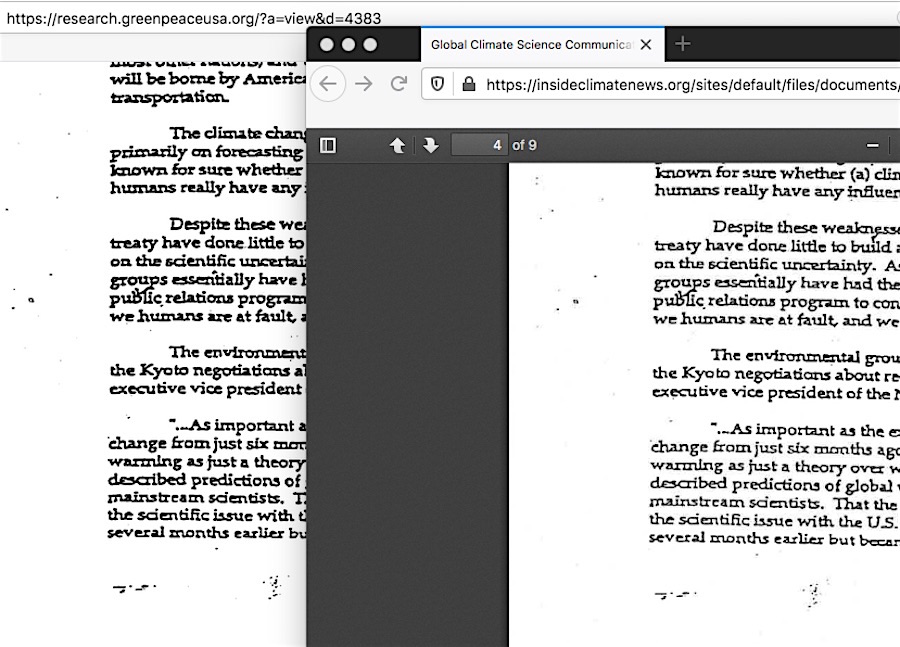
But just one year prior to the above 2017-dated CIEL material at Greenpeace, there was this 2016 Greenpeace site-specific “Twenty Years Later, This GOP Congressman Is Still Using Exxon’s Talking Points” piece, where the author mentioned the API memos and provided a link, (“http://www.climatefiles.com/exxonmobil/1998-global-climate-science-communications-team-action-plan/”), embedded in the “Global Climate Science Communications Action Plan” words there. Avid followers of my work here will readily recognize that website address as ex-Greenpeace/ExxonSecrets Kert Davies’ current Climate Files website. A.k.a. as ‘what’s new is still the same old worthless accusations’ site.
Surely, Davies own site would point to his old workplace’s glorious role in this API memos situation, wouldn’t it?
Nope. That particular Climate Files webpage offers nothing about its source for the scans, but the scans in that page are clearly identical to Greenpeace’s scans – same scratches, dots in the margins and additional trash at the bottom edge.
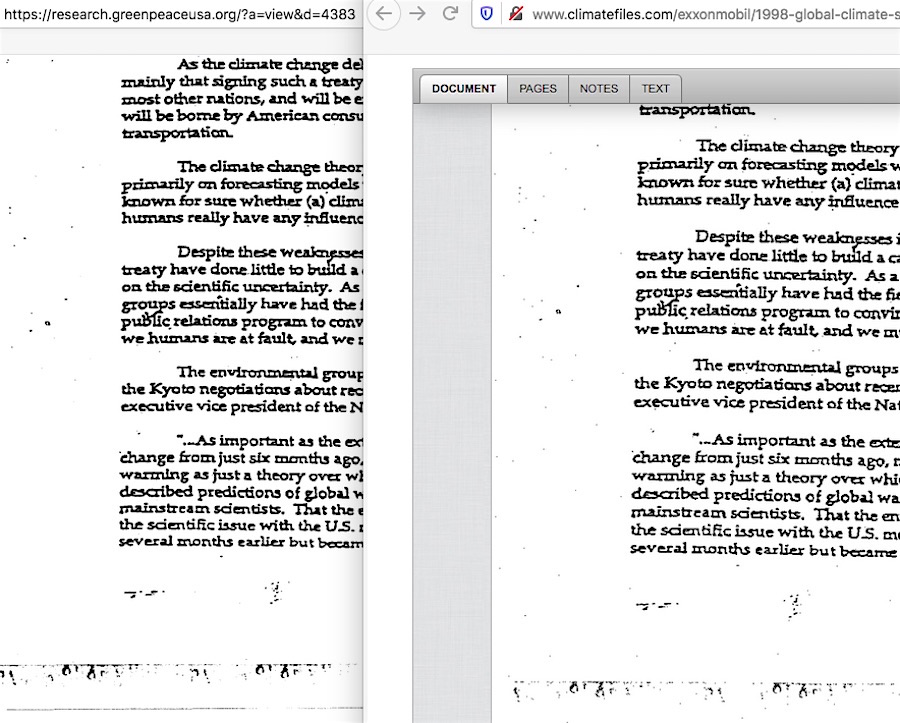
Have a look elsewhere in Davies’ companion “Climate Investigations Center” (“CIC”) website, and within his June 4, 2018 “Climate Lawsuits: Depose Lee Raymond and Rex Tillerson” page, he shows a scan and its source underneath it, which is a link to the utterly vague “DocumentCloud” internet storage site. What’s seen there? A cryptic “Staff 7” source from his own CIC site …… while the scans themselves are identical to Greenpeace’s scans – same scratches, dots, and trash at the bottom.
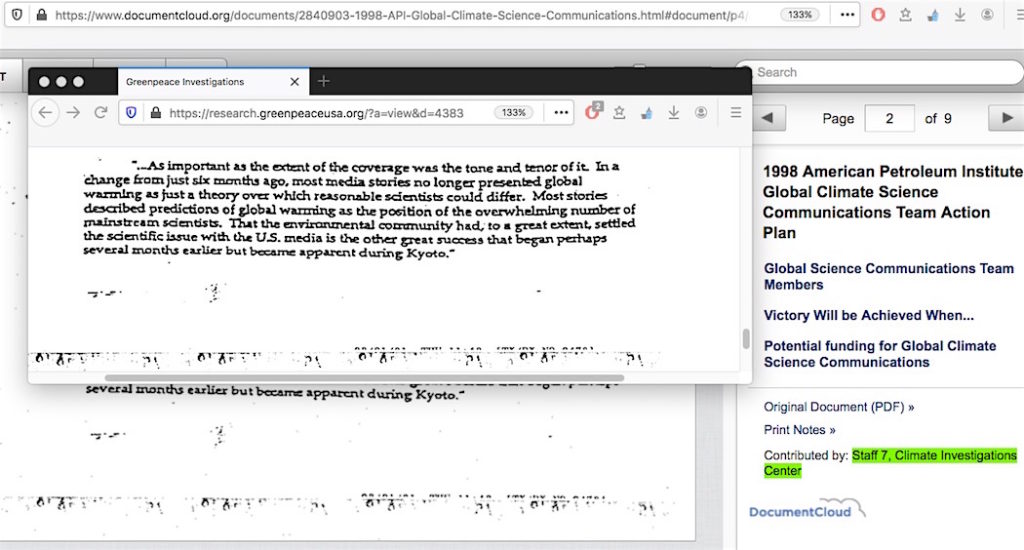
Piling on, now: In a 2015 Guardian article authored by Desmogblog’s Graham Readfearn, Kert Davies is mentioned, as are the API memos via three links, embedded in the words “Global Climate Science Communications (GCSC) plan,” “memo,” and “analysis for this report” …. except here, the links all result in the Document Cloud upload of the memo from Readfearn. By this time, it’s getting redundant to compare what’s seen to the Greenpeace scans, and all Readfearn did was upload Desmog’s API memos scans copies from Greenpeace, anyway.
Piling more on: Go back one year earlier to Kert Davies own February 20, 2014 CIC piece about the American Legislative Exchange Council. He mentioned the API memos and provided a link, embedded in the “American Petroleum Institute’s Global Climate Science Communications Plan” words there …. which was his own Document Cloud upload dating apparently from a year earlier when he was still working for Greenpeace. No need to compare those to Greenpeace scans; they are by default Greenpeace’s scans.
Back to where I started at the top, it’s ironic how Evert Wesker made his reference to Shell disappear.
All this other recent stuff looks like little more than a shell game designed to throw people off from seeing how Greenpeace appears to be the solitary source for the API “Victory will be Achieved…” memos.
Memos that are worthless as evidence to a prove sinister fossil fuel disinformation campaign arose from them because they were not only unsolicited* and never implemented, but also because the supposedly devastating central statements within them are no more than basic truisms which could be mirror-flipped for Greenpeace to use in determining the effectiveness of their own propaganda efforts. [*Author’s 5/13/21 note: this is corrected/clarified here]
Recapping what I illustrated at the end of Part 1, what’s sinister about “Victory will be achieved when the public and objective reporters learn about a skeptic side of the global warming that’s been suppressed”?
Nothing. Who does not see a problem with this alternative, though?
“Victory will be achieved when the public and reporters unquestioningly believes worthless never-implemented leaked memo proposals are evidence of sinister corporate-orchestrated disinformation campaigns, and never asks anything about the origins of the memos.”
